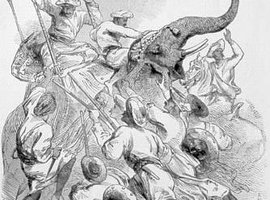Bicholim Conflict: fictitious war for Goan independence that fooled Wikipedia for five years
“Bicholim Conflict” was voted a “good article” – a Wikipedia badge of honor – and sat happily on the online encyclopedia for more than half a decade.
But editors have lately discovered a small issue with the site’s meticulously written 4,500 word article detailing the 17th century Bicholim Conflict.
It was entirely made up.
After five years of featuring the piece, which tells the story of “how colonial Portugal clashed with India’s massive Maratha Empire”, Wikipedia has admitted the entire conflict and books cited as sources for the piece are fictional, the Daily Dot reports.
The only source seems to be an unidentified and mischievous Wikipedia user dedicated to putting extraordinary amounts of effort into promoting his or her own fantasy historical conflict and getting one over on Wikipedia in the process.
“From 1640 to 1641 the might of colonial Portugal clashed with India’s massive Maratha Empire in an undeclared war that would later be known as the Bicholim Conflict,” the article read.
“Named after the northern Indian region where most of the fighting took place, the conflict ended with a peace treaty that would later help cement Goa as an independent Indian state.”
It continues, in precise detail, to explore what happened in the fictional war and lists some 17 references, as well as three suggestions for further reading – which all appear to be a work of the writer’s imagination.

After five years of featuring the Bicholim Conflict, Wikipedia has admitted the entire conflict and books cited as sources for the piece are fictional
The article’s conclusion may have given some hint of its veracity: “The conflict was fairly brief and its impact in terms of casualties and damage was minimal. For this reason, it has not become much of a talking point amongst filmmakers and bookwriters.”
The hoax was only uncovered when another user from Missouri, known as ShelfSkewed, finally realized the deception and nominated the article for removal.
“After careful consideration and some research, I have come to the conclusion that this article is a hoax – a clever and elaborate hoax, but a hoax nonetheless,” they wrote.
“An online search for <<Bicholim conflict>> or for many of the article’s purported sources produces only results that can be traced back to the article itself.”
Wikipedia acted on his warning and promptly removed the piece.
But not before it was labeled a “Good Article” by Wikipedia editors just two months after its creation in July 2007.
It was also nominated for a featured article – Wikipedia’s gold star for research.
And even though site admin didn’t approve the recommendation they didn’t stumble across the fact the entire piece was a wind-up
“Unfortunately, hoaxes on Wikipedia are nothing new, and the craftier they are, the more difficult it is to catch them,” William Beutler, president of Beutler Wiki Relations, a Wikipedia consulting firm, told Yahoo News.
“Anyone who’s clever enough to make up convincing sources and motivated enough to spend the time and skilled enough to write a plausible article can deceive whole Internet – at least for awhile.”
Indeed, several hoaxes have taken place on the crowd-sourced encyclopedia site, so much so that the encyclopedia has its own page detailing them.
At least one place where the Bicholim Conflict lives on.
